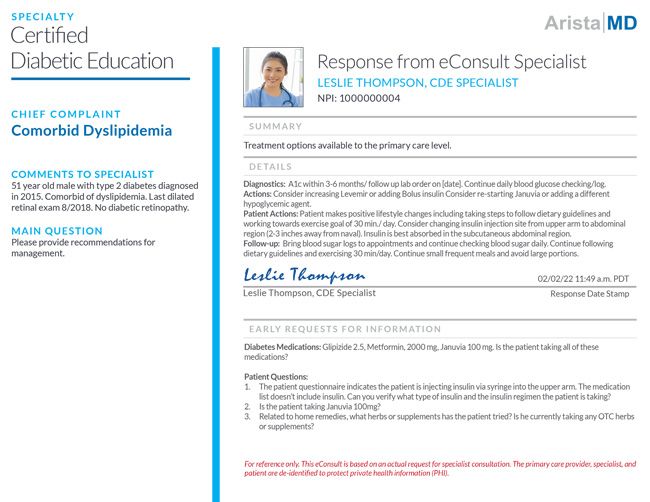Managing Patients with Comorbidities
AristaMD’s Pamela Gould, RN, MHA, discusses eConsult best practices for managing the care of patients with comorbidities, particularly those struggling with multiple comorbid conditions. This discussion will focus on a patient case and demonstrate how eConsults can be used to improve equity in access to care and eliminate wait times.
Learn how an eConsult can:
• Eliminate long wait times for face-to-face specialist appointments
• Consolidate information sharing and improve care coordination
• Prevent costly escalation of care by helping patients receive care faster and avoid a visit to the ED.
Transcript:
As many of you know, there are many challenges related to specialty care access, regardless of where you’re practicing — health system, correctional facility, tribal location, or provider practice. The need for specialty care access in most regions has almost doubled since the pandemic. As a result, patient wait times are increasing. We can often see additional challenges for patients covered by Medicare or Medicare advantage. These patients may have travel concerns or few physicians in the region accept Medicaid patients. We also see patients that have difficulty taking time out of work or accessing childcare. There’s a number of reasons why specialty care access is difficult.
All of these challenges lead to healthcare disparity, which we are addressing through electronic physician-to-specialist consultations. When we look at patients with comorbidities or that have complex medical conditions, delays in care will often equate to poor health outcomes. This is where eConsults make an impact. Today we will review what is an eConsult, what to expect from an eConsult program and why patients need coordinated care across multiple specialties. The main portion of the presentation will focus on:
- How to use an eConsult to treat patients with comorbidities.
- What happens when the patients are waiting for care?
SAMPLE eConsult
Certified Diabetes Education
CHIEF COMPLAINT
Comorbid Dyslipidemia
COMMENTS TO SPECIALIST
51-year-old male with type 2 diabetes diagnosed in 2015. Comorbid of dyslipidemia. Last dilated retinal exam 8/2018. No diabetic retinopathy.
MAIN QUESTION
Please provide recommendations for management.
Request a Demo
Improve Patient Access Management During the Healthcare Staffing Crisis
Patient access management is a high priority currently, due to patients deferring care during COVID and a short supply of providers. Modern Healthcare reports that wellness visits declined 69% during 2020. With a flood of patients that are overdue for care, states are turning to nurse practitioners (NPs) and physician assistants (PAs) to improve access to primary care.


